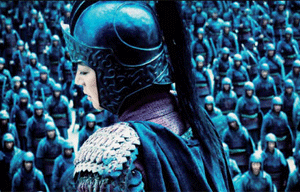'Inflation remains a top priority'
Updated: 2011-10-26 07:38
By Lan Lan (China Daily)
|
|||||||||
BEIJING - Fighting inflation remains China's top priority and policymakers should fine-tune policy in a timely manner on the basis of economic trends, State radio on Tuesday cited Premier Wen Jiabao as saying.
He also said the country should maintain reasonable credit growth, optimize financing structure and improve levels of financing.
It's important to synergize credit policies with industrial policies, ensure funding for key investment projects and support real economy, the premier said.
Lu Zhengwei, chief economist of Industrial Bank, said fighting inflation remains a top priority, indicating that an overall relaxation of macroeconomic policy is unlikely.
"Economic growth has declined but it is still within an acceptable range. Inflation has shown a downward trend but is still higher than the target, so an overall relaxing won't happen," Lu said.
"However, if economic growth dips more than expected, policies will be adjusted," he said.
China's economic growth slowed in the third quarter to a lower than expected 9.1 percent amid government efforts to prevent overheating and rebalance the economy.
The country's consumer price index (CPI), a main gauge of inflation, eased to 6.1 percent in September from 6.2 percent in August and a 37-month high of 6.5 percent in July. The government's full-year target is around 4 percent for the year.
Inflationary pressure has eased as the CPI has probably already peaked, said Zhang Jianping, senior researcher at the Institute for International Economic Research under the National Development and Reform Commission.
"The overall economic scenario has changed compared with months ago. The pressure of imported inflation has decreased and cooling measures taken to control inflation have achieved good results," said Zhang.
At the same time, many small enterprises are facing financial predicaments.
Lu said policy adjustments have made small enterprises a greater priority for bank credit support, allowing them to enjoy more preferential tax policies.
Allowances have also been made for local government to issue debts.
The cash shortage that faced small enterprises and social housing projects means China's economic development needs new measures, said Zhuang Jian, senior economist with the Asian Development Bank.
"However, it's still too early to make big policy changes, but structural easing is necessary," he said.
Reuters contributed to this story.











